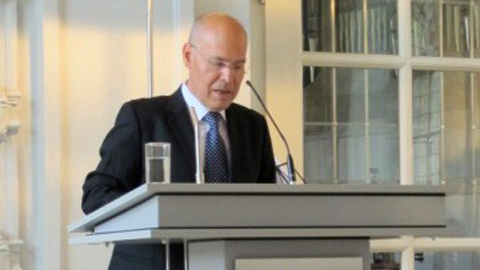José Martínez Gázquez member of the new European Academy of Religion

12/01/2017
José Martínez Gázquez, lecturer of the Department of Antiquity and Middle Age Studies is one of the experts invited to form pat of the new European Academy of Religion. The academy has been created under an initiative of the Fondazione per le Scienze Religiose Giovanni XXIII of Bologna, Italy, and is directed by historian Alberto Melloni, with the support of the European Parliament and UNESCO. Both lecturer Martínez Gázquez and the research group to which he belongs, Islamolatina, are participating and founding members of the academy. The Department of Antiquity and Middle Age Studies also gives its support to the academy and the UAB itself is also in the process of becoming a member.
The academy includes over 3,000 experts, 400 of which met on 5 December 2016 in the first public event of the academy.Among those attending were lecturer Martínez Gázquez and Antoni Biosa, lecturer at the University of Alacant and member of Islamolatina. The event was inaugurated by the former President of the European Commission Romano Prodi and included the participation of EU Special Envoy on Freedom of Religion or Belief outside the EU Jan Figel and the European Commissioner for Research, Science and Innovation Carlos Moedas.
The objective of the academy is to create a network of hundreds of experts, associations, entities, universities, research centres and journals focusing on religion from academic disciplines. The topic is extensive and includes all disciplines related to religion, such as history, ethics, communication, sociology, philosophy, art and political science. The academy will organise an annual conference to talk about these topics, with each edition including a publicly chosen topic and one proposed by the academy itself.
The academy will begin its activities in 2017 and will act as a consortium for research and exchange between its members, as well as give visibility to the scientific work conducted. The academy will be a meeting point for the pluralism of Europe and will offer the experience of realities ranging from south of the Mediterranean, Slavic countries, the Caucus and all the way to the Middle East.